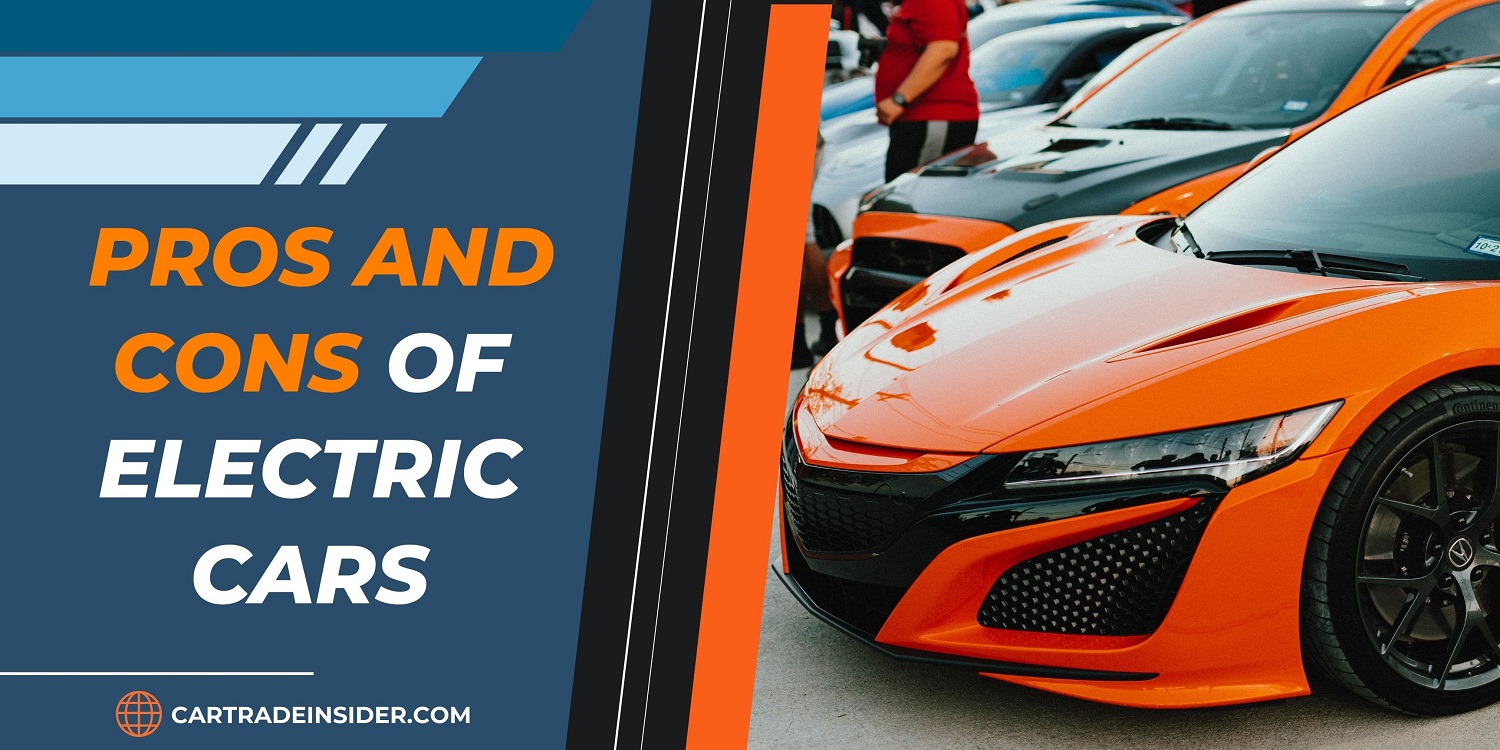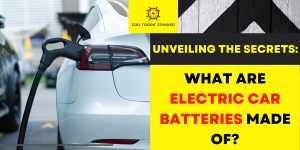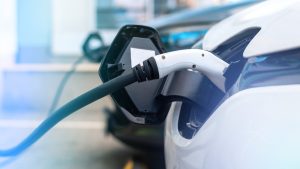Electric cars might seem like something out of a sci-fi movie, but they’re becoming more and more common on our roads. And guess what? They’re not just good for the planet—they’re pretty cool too.
However, before making the switch to an electric vehicle (EV) you need to understand the nuanced advantages and disadvantages. Let’s delve into the intricacies of electric car ownership and explore how these vehicles align with your lifestyle and values.
How Electric Cars Work:
Electric cars, as the name suggests, run on electricity instead of gasoline. They’re powered by a battery that’s charged using an external electricity source.
There are various types of electric and hybrid vehicles, including all-electric cars (AEVs) and plug-in hybrid electric vehicles (PHEVs), each with its unique blend of technology.
Pros of Electric Cars:
Lower Fuel Costs:
Charging an electric vehicle at home is generally cheaper than fueling a gas-powered car. While public charging can be pricier, it’s still often less expensive than gasoline for the same mileage.
Studies show that EV drivers spend about 60% less annually on fuel compared to gas-powered cars. Savings vary by region, with electricity rates often lower during off-peak hours.
Calculating charging costs based on your EV’s efficiency and local electricity rates can help estimate savings compared to gasoline.
Tax Incentives:
Government incentives, such as tax credits, can help offset the initial cost of purchasing an EV, making them more accessible to consumers.
You can further reduce costs with tax incentives, potentially shaving thousands off an EV’s price tag. The federal EV tax credit offers up to $7,500 for new EVs and, for the first time, $4,000 for used EVs, benefiting eligible buyers.
New rules allow auto dealers to apply this credit directly to the purchase, making savings immediate. Keep in mind that certain EV models qualify based on manufacturers meeting specific production requirements.
Backup Power Capability:
Some EVs offer the ability to use their battery power to supply electricity to external devices or even homes during power outages, enhancing their utility.
An average EV battery can power a household for up to two days, offering critical support during emergencies. Larger EVs like buses and trucks boast even more substantial batteries, amplifying their potential to keep homes and communities safe.
Energy Efficiency:
Electric cars are remarkably energy-efficient, converting a higher percentage of energy into vehicle movement compared to their gasoline counterparts.
Electric vehicles (EVs) demonstrate superior energy efficiency over gasoline-powered cars, with electric drive systems experiencing only a 15% to 20% energy loss, compared to a substantial 64% to 75% loss in gasoline engines.
This efficiency is further enhanced by regenerative braking, which recaptures and reuses energy typically lost during braking, boosting overall efficiency by up to 77% when factored into calculations.
Unlike conventional vehicles, EVs minimize idle losses, with electric motors ceasing energy consumption when the vehicle is stationary, contributing to efficiency gains.
Electrical accessories in EVs draw power directly from the battery, with minimal losses from components like electric door locks and signal lights, although auxiliary electrical losses may increase in extreme cold conditions.
Efficient charging and powertrain systems further optimize energy usage, ensuring that EVs operate with maximum efficiency while minimizing environmental impact.
Emissions Reduction:
Since electric cars rely on rechargeable batteries rather than combustion engines, they produce zero tailpipe emissions during operation. This eliminates the release of pollutants such as carbon dioxide (CO2), nitrogen oxides (NOx), and particulate matter, which are major contributors to air pollution and climate change.
While EV production may initially generate more carbon pollution due to battery manufacturing energy requirements, total emissions over the vehicle’s lifetime, including manufacturing, charging, and operation, are generally lower than those of gasoline cars.
Recycling EV batteries further mitigates emissions by reducing the need for new materials, despite current challenges, showcasing ongoing research to enhance EV battery recycling processes.
Lower Maintenance Requirements:
Electric cars boast simpler and more durable drivetrains compared to traditional internal combustion engine vehicles. With fewer moving parts and no complex engine components, electric cars require less maintenance over their lifetime.
For example, there’s no need for oil changes, spark plug replacements, or exhaust system repairs. This translates to lower maintenance costs and fewer visits to the mechanic, saving you time and money in the long run.
Additionally, the regenerative braking system in electric cars helps prolong brake life by reducing wear and tear on brake pads and rotors.
Quick Acceleration and Serene Silence
Electric cars offer a superior driving experience characterized by smooth, quiet operation and instantaneous torque delivery. Electric motors deliver power seamlessly, resulting in responsive acceleration and nimble handling.
This instant torque provides a thrilling driving experience, especially in urban settings where quick acceleration and maneuverability are essential. Additionally, the absence of engine noise enhances cabin comfort, creating a serene driving environment for occupants.
Overall, electric cars offer a compelling blend of performance, efficiency, and comfort that enhances the driving experience for urban professionals and enthusiasts alike.
Cons of Electric Cars
Limited Range:
Despite advancements in battery technology, many EVs still fall short in terms of mileage, with typical ranges hovering between 60 to 300 miles. This limitation often triggers range anxiety among drivers, particularly in regions with sparse charging infrastructure.
However, new electric vehicles with extended ranges exceeding 450 miles are entering the market, challenging previous limitations on travel distance.
This shift offers consumers greater flexibility and addresses concerns about range anxiety, as these advanced models provide ample mileage for long-distance journeys without frequent recharging.
As the automotive industry continues to evolve, addressing the conundrum of limited range remains a critical focus area, necessitating ongoing innovation and infrastructure development to enhance the appeal and practicality of EVs for a wider audience.
Longer Charging Time:
Charging an electric car can be a time-consuming process compared to refueling a gasoline vehicle. While fast chargers can replenish an EV’s battery to 80% in as little as 20 minutes, more widely available Level 2 chargers require several hours for a full charge, and Level 1 chargers, commonly used at home, can take over two days.
This prolonged charging process exacerbates “range anxiety,” the fear of running out of charge mid-journey, which remains a significant concern for potential EV buyers. To address this issue, scientists are exploring various avenues to accelerate the charging process while ensuring safety and battery longevity.
These efforts include tweaking battery chemistries to facilitate faster lithium ion movement, updating charging algorithms to optimize current flow, and developing innovative cooling technology for charging cables to handle higher amperes.
Higher Upfront Costs:
While electric vehicles (EVs) offer long-term savings on fuel and maintenance expenses, the initial purchase price can be a barrier for some buyers. Additionally, the availability of federal and state incentives, such as tax credits and rebates, may vary depending on location and eligibility criteria.
While these incentives can help offset the upfront cost of electric car ownership, they may not fully eliminate the price differential compared to gasoline vehicles.
As a result, potential buyers must weigh the upfront costs against the long-term benefits of electric car ownership, considering factors such as fuel savings, maintenance costs, and environmental impact over the vehicle’s lifespan.
Battery Life and Replacement Costs:
Electric car battery replacement costs are a significant consideration for potential EV owners. While batteries degrade over time due to calendar aging and other factors, the prospect of having to replace them can be daunting.
Currently, EV battery replacements range from $5,000 to $20,000 depending on factors like pack size and manufacturer. If a battery is still within its manufacturer warranty, typically 8 years and 100,000 miles, replacement is often covered at no extra cost. However, for out-of-warranty replacements, costs can vary widely.
One notable trend is the increasing demand for second-hand EV batteries, leading to higher prices. As more people switch to electric vehicles, the availability of used batteries diminishes, driving up costs. Despite this, batteries in cars are degrading at a slower rate than expected, contributing to the scarcity of available replacements.
Limited Towing Capacity:
The impact of towing on an EV’s range can be substantial, with some carmakers indicating that towing can reduce range by as much as 50 percent, depending on the weight of the load. When an EV tows a heavy load, it requires more energy to move, which in turn drains the battery faster and diminishes the driving range.
This reduction in range underscores the importance of considering both the vehicle’s towing capacity and its driving range when choosing an EV for towing purposes.
While trucks are generally the best choice for towing with EVs due to their solid towing capability, SUVs also offer impressive tow ratings. Some EV models, such as the Rivian R1T and the Chevrolet Silverado EV, can tow up to 11,000 pounds, providing substantial towing power for various needs.
Looking for the perfect ride to tackle your towing needs? Explore our top recommendations in our guide to the best SUVs for towing.
Battery Degradation:
Over time, EV batteries may experience reduced range due to degradation, influenced by factors such as usage, charging habits, and environmental conditions.
Batteries can lose 5% to 10% of their capacity in the first five years, with degradation continuing over time due to various factors like age, temperature, and fast charging.
Battery health is crucial for used EV buyers, as the battery is the most expensive component. Excessive degradation may require costly repairs or replacements, posing a significant barrier for buyers.
Challenges in Cold Weather:
Cold weather poses challenges for electric vehicle (EV) drivers, leading to longer charging times, weaker battery performance, and unexpected delays at charging stations.
Drivers experience frustration as charging sessions take up to 90 minutes, compared to the usual 15 to 20 minutes, while some wait for over an hour to top up their batteries.
Technical issues arise due to the need to precondition EV batteries for optimal charging in cold temperatures. As temperatures drop, charging stations see increased queues, resembling car graveyards, with some EVs becoming inoperable due to freezing conditions.
Limited Battery Recycling:
Electric vehicle (EV) batteries, primarily lithium-ion, pose a challenge for recycling due to their complex composition and lack of standardization. Recycling EV batteries involves dismantling them, a task complicated by varying sizes and configurations across different EV models.
This complexity makes recycling both expensive and hazardous. Additionally, safety concerns arise from the risk of fire, especially with older or damaged batteries.
Recycling methods include pyrometallurgical and hydrometallurgical processes, each with drawbacks such as high energy consumption or the need for extensive component breakdown.
Challenges in Finding Charging Stations:
The shortage of charging stations is a growing concern for electric vehicle (EV) owners, leading to range anxiety in many areas. However, the federal government’s Infrastructure Investment and Jobs Act, passed in 2021, aims to address this issue by allocating $7.5 billion for EV charging infrastructure.
This initiative plans to establish an extensive network of 500,000 chargers along 75,000 miles of designated corridors across the U.S., ensuring accessibility for both rural and urban communities.
Currently, there are approximately 56,000 EV charging stations nationwide, with 52,000 open to the public. Despite this, home charging remains the primary method for most EV owners, posing challenges for those in shared housing or street parking situations.
Want to expand your knowledge beyond the pros and cons? Check out our article on ‘shocking facts about electric cars‘ for more fascinating insights!
Is Owning an EV Right for You?
Ultimately, the decision to switch to an EV depends on your individual needs and priorities. If you prioritize environmental sustainability, cost savings, and a smoother driving experience for your daily commute, an EV might be the perfect fit.
However, if you frequently embark on long-distance trips or prioritize upfront affordability, you may want to weigh the pros and cons carefully. Additionally, considering complementary solutions like solar panels for home charging can further enhance the benefits of owning an EV.
Ready for your next adventure? Explore our top picks for the best cars for long-distance driving in our comprehensive review.
Conclusion:
In conclusion, electric cars offer a compelling blend of environmental benefits, cost savings, and driving satisfaction for urban professionals like yourself.
By carefully considering the pros and cons of electric car ownership and integrating sustainable transportation practices into your lifestyle, you can play a pivotal role in shaping a cleaner, greener, and more resilient future.
So, embrace the electrifying journey ahead and join the movement towards sustainable mobility. The road to a brighter tomorrow starts with your decision today.




